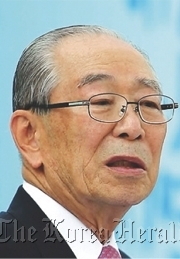 |
A customer buys a Bacchus drink at a convenient store. (Yonhap News) |
Dong-A Pharmaceutical, Korea’s largest drug maker, is grappling with controversy over corporate governance as it plans to set up a holding company and put its cash cow energy drink business, Bacchus, under an unlisted firm.
With the National Pension Fund, which controls a 9.5 percent stake in Dong-A, holding the casting vote, industry observers expect the state-run fund’s stance to be an indicator of the incoming Park Geun-hye administration’s policy on corporate governance.
The case is drawing more attention as Seoul Investment Club, a maverick private equity fund that seeks to improve the corporate governance of chaebol companies here, and a group of minority shareholders have deprecated Dong-A’s reorganization scheme, claiming it would only tighten the chairman’s family’s control over the group’s top assets and undermine shareholder value.
They note that putting its money-making Bacchus and over-the-counter drugs under an unlisted firm completely controlled by the holding company would reduce general shareholders’ clout and allow the expedient transfer of wealth to the chairman’s children, arbitrary spin-off or sale of the company. Chairman Kang Shin-ho and his family hold a 14.64 percent stake in Dong-A.
Seoul Invest, led by shareholder activist Park Yoon-bae, made headlines in 2010 for orchestrating a revolt by minority shareholders of Taekwang Industrial, which put the company’s chairman in jail and led its stock prices to skyrocket. In 2009, he filed Korea’s first class action suit for small shareholders against the management of a manufacturer named Jinsung T.E.C.
“Major shareholders of Dong-A Pharmaceutical asked us to analyze whether the planned split-up would undercut shareholder value,” Park said.
“Although we do not hold a stake in Dong-A, we saw a need to come forward, and sent a request to Dong-A to revise its plan.”
Seoul Invest has warned that it will take legal action against the management should they go ahead with the plan to split up Dong-A Pharmaceutical, and has asked major shareholders including GlaxoSmithKline and the National Pension Fund to ballot against it at the shareholders’ meeting.
 |
Chairman Kang Shin-ho |
Dong-A Pharm’s shareholders are scheduled to vote next Monday on the company’s plan to split itself into two business corporations that make prescription drugs (Dong-A ST) and over-the-counter drugs (Dong-A Pharm), and set up a holding company named Dong-A Socio Holdings that holds a 100 percent stake in Dong-A Pharm.
GSK and Otsuka, which own 9.9 percent and 7.9 percent stakes in Dong-A, respectively, are believed to be on the Kang family’s side, while rival companies Hanmi Pharmaceutical (8.7 percent) and Green Cross (4.2 percent) have not declared their positions on the split-up plan.
This means the National Pension Fund holds the casting vote at Monday’s meeting, putting to test President-elect Park’s pledge to have the state-run fund exercise its voting rights more actively.
Speculation is gaining ground that the world’s fourth-largest pension fund would oppose the split-up in line with Park’s pledge, while others say it may state a neutral stance in consideration of complications that might arise regarding its investments elsewhere.
If the National Pension Fund, which holds significant stakes in most large conglomerates in Korea, starts to actively exercise its voting rights, it is expected to greatly impact the country’s corporate governance. There are concerns, however, that the state-run fund could wield too much power and weaken companies’ free management.
In a bid to quell concerns that Dong-A Pharm could be sold off with just the approval of the board directors of the holding company, the company said last week that it will state in its articles of association that it will not sell the Bacchus business division without shareholders’ approval. The drug maker has insisted that its sole aim is to have the holding company provide stable investment for developing new drugs.
Nevertheless, minority shareholders still fear that the split-up could cause stock prices to drop and allow only the largest shareholder to profit.
Executives at Dong-A Pharm were indicted earlier this month on charges of giving kickbacks worth around 4.8 billion won to doctors at some 1,400 hospitals in exchange for using or prescribing their products.
By Kim So-hyun (
sophie@heraldcorp.com)









